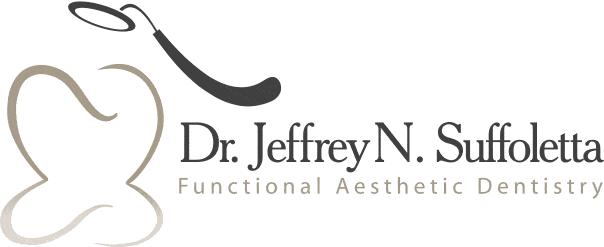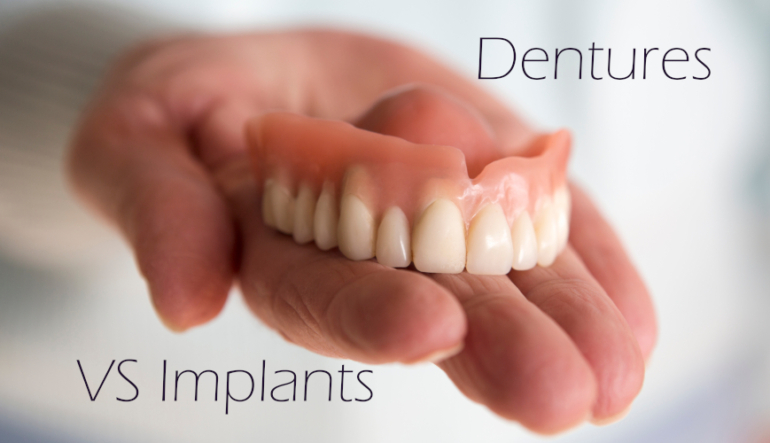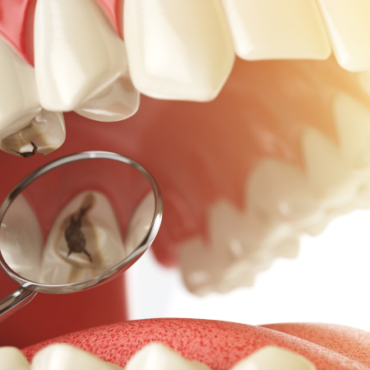Dentures vs Dental Implants
Missing teeth can have a substantial impact on a person’s life, both psychologically and physically. A diminished self-esteem and poor or decayed oral health are just a small piece of the problems. If you’ve experienced tooth loss, you’re not alone and it’s nothing to be ashamed of. Almost 70% of American adults between the ages of 35 to 44 years are missing at least one tooth, with 1 in 4 people over 74 missing all of their natural teeth. However, if you’ve suffered tooth loss, you’ll be glad to know you have options when you decide to look for a suitable replacement. Two ways to replace missing teeth are:
- Dental implants
- Complete or partial dentures
RELATED ARTICLE: Waterlase Dentistry Provides Gentle and Fast Service to Patients
What Are Complete & Partial Dentures?
Both of these types of dentures are removable, but they have some key differences. The biggest difference is that complete dentures replace an entire set of upper or lower teeth, while partial dentures fill in gaps. In addition, a complete denture rests directly on your gums and is affixed with an adhesive.
In contrast, a partial denture is supported with clasps around existing teeth or is stabilized with precision attachments fitted onto crowns. Some partial dentures can include a metal framework for added strength and support.
What Are Dental Implants?
If the idea of wearing dentures for the rest of your life makes you feel disheartened, dental implants might be an ideal way to replace your missing teeth. Dental implants are titanium roots that are inserted into bone to stabilize replacement teeth in the form of crowns, dental bridges, or dentures.
While an implant procedure appears to be expensive, dental implants can last for multiple decades with proper care. This longevity and high success rate is actually much cheaper over the lifetime than many other lesser treatments. Patients with sufficient soft tissue in the mouth and bone mass in their jaw are usually good candidates for dental implants. If this is not the case, however, a dentist can usually perform a bone grafting procedure to augment the jawbone in preparation for implants.
RELATED ARTICLE: The Evolution of Aesthetic Dentistry
Dentures vs Dental Implants: Which is right for you?
There are various considerations when choosing between dental implants and dentures. Your jaw health, convenience, comfort, cost, function, and longevity. While dental implants are by far the most stable and long-lasting, there are barriers to being a good candidate for them. As mentioned above, if you have insufficient bone mass due to tooth loss, your dentist may be able to do bone grafting in preparation for an implant procedure. However, if you have a degenerative bone condition that affects the strength of your jawbone, dentures may be a better option for you.
When it comes to convenience, your preference will depend on whether or not you see dentures being removable as appealing and convenient. While this makes it easy to clean them thoroughly, implants offer the convenience of a permanent device that looks, feels, and functions like natural teeth. Although dentures have come a long way and resemble natural teeth surprisingly well, they are not as stable as dental implants. If not perfectly fitted, they can slip and slide in your mouth, making them uncomfortable, as well as making it difficult to chew, swallow, and speak clearly. The final difference between these two options that’s important to consider is cost.
Dentures vs Dental Implants: Cost Comparison
The costs for dental implants can vary widely, depending on the need for procedures that are a pre-requisite to placing the implant. If you have a strong, healthy jawbone and don’t require additional procedures. The cost are as follows, this does not include the costs for abutments or replacement teeth.
- Abutments & replacement teeth can run between $500 and $3,000 per tooth.
- A single dental implant can cost between $1,000 and $4,000.
- Implant-supported complete dentures are quite expensive, costing between $30,000 to $50,000.
Costs for complete dentures also differ greatly based on whether their quality is basic, mid-range, or premium.
- Basic quality full dentures typically cost between $600 and $1,000
- Mid-range dentures run between $1,000 to $2,000.
- Premium dentures can cost as much as $4,000 to $8,000.
Although this is getting into the price range of implants, remember that the implant cost above is for only one implant.
Partial dentures can cost can vary, depending on how many teeth are being replaced and the quality of materials. The amounts that dental benefits will cover will also play a part when you’re weighing the costs of dentures vs dental implants. Parts of both procedures are typically covered, but how much they cover will depend on your particular plan.
When it comes to replacing or restoring your teeth, it’s good to know that you have options. Finding a functional aesthetic dentist would go a long way to getting your smile back on track.






